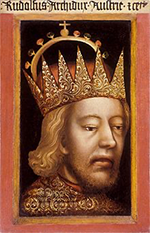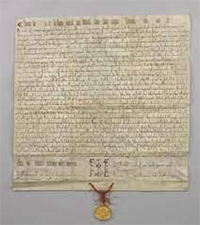Privilegium Maius: Austrian Method of Elevation, Deception
The Privilegium maius was a set of forged documents designed to elevate the prestige and political rights of the Duchy of Austria in the 14th Century. 
The House of Habsburg had ruled the Duchy of Austria since 1282, and a few Habsburg rulers had also been King of the Romans (Germany). One such aspirant was Rudolf IV (left), whose grandfather, Albert I, and uncle, Frederick III had both been King of the Romans. Rudolf had become Duke of Austria and Styria in 1358. He set about trying to compete with the Holy Roman Emperor, Charles IV. The emperor issued the Golden Bull of 1356, which solidified the list of electors who were to choose the King of the Romans (Germany). For many years, this had been an elected position. That Golden Bull named seven prince-electors who would have full power to choose their next leader. Those seven were the Archbishop of Cologne, the Archbishop of Mainz, the Archbishop of Trier, the Count Palatine of the Rhine, the Duke of Saxony-Wittenberg, the King of Bohemia, and the Margrave of Brandenburg.  Nowhere in that seven was the Duke of Austria or anyone of the Habsburg line. An incensed Rudolf issued an official reply two years later in the form of the Privilegium maius, a series of "found" documents that elevated Austria to the status of an archduchy, with rights equal to the prince-electors named Charles IV's Golden Bull. The "declaration of great privilege" had as its model the Privilegium minus, a declaration by the Holy Roman Emperor Frederick Barbarossa in 1156 that elevated Austria from a margraviate to a duchy. The new declaration was a group of five documents, of which more than one were said to date to Roman times. Among the rights granted to Austria by the Privilegium maius were an independent government, negating any ability by the Emperor to overrule or interfere; a set of borders that could not be unfixed; and a clear rule of inheritance based on the idea of primogeniture, whereby the firstborn child inherits the father's main estate, lands, and titles. The emperor recognized this claim for the falsity that it was and refused to recognize the Habsburg ruler's claims. The title archduke stuck, however, and was used by Ernest of Iron in the early 15th Century and then by many rulers going forward. |
|
Social Studies for Kids
copyright 2002–2026
David White




